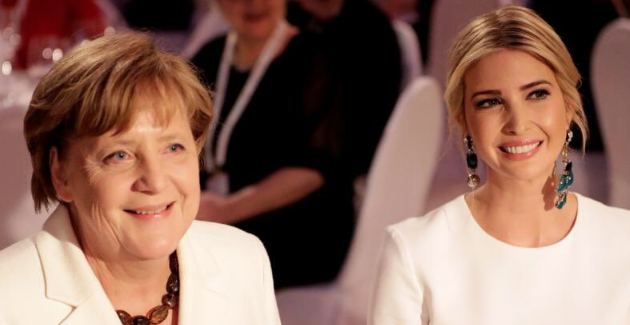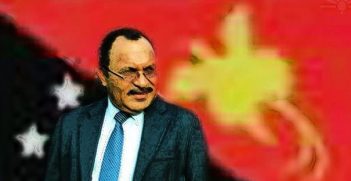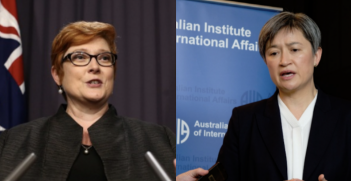Beyond Ivanka: The W20 Summit Made Real Progress

The attention directed toward Ivanka Trump’s participation in the recent Women20 Summit in Berlin overshadowed the important progress made at this year’s event. Thanks to the strong leadership of Angela Merkel, the final communiqué outlines vital goals for women’s economic empowerment, which the G20 now needs to seriously consider.
The third annual Women20 (W20) summit was held in Berlin on 24–26 April. The W20 summits were created as part of the G20 process, following discussions that took place at the Brisbane W20 meeting in November 2014. The initial W20 was held in 2015 in Istanbul, Turkey, followed by the second in Xian, China, in 2016. This year, for the first time all 20 members were represented in person.
The 2017 summit received far more publicity than either of the previous two. If the organisers had hoped that the inclusion of Ivanka Trump would bring the Berlin event to the world’s attention, they were rewarded in spades. It’s a sad fact of life that celebrities draw the crowd, and the twitterati spread the word that Ivanka had been booed when she tried to reply to a question from the session moderator about her father’s attitude to women. This was backed up by 30-second grabs on television networks around the world. For those in the room, it didn’t sound like booing but rather a few groans. And not everyone in the audience thought the question was appropriate for a discussion on ‘Inspiring women: Scaling up Women’s Entrepreneurship’.
In any case, the session was indeed inspiring; all its participants spoke passionately about improving opportunities for women to start their own businesses. Christine Lagarde, managing director of the IMF, spoke of the need not just to find “actors” but “activists”. She went on to say that increasing’s women’s participation in the workforce could boost growth in the US by 5 per cent and in India by 23 per cent. Advancing gender equality could add US$12 trillion (AU$15.9 trillion) to the world economy by 2025. Canadian Minister for Foreign Affairs, Chrystia Freeland, warned that there will be conflict in some families as women become more assertive; Lagarde argued that, though men might feel threatened, women’s empowerment is not a threat.
In the six weeks prior to the summit this year, around 100 delegates from the G20 participated in discussions that concentrated on four key areas: labour market inclusion, financial inclusion, digital inclusion and strengthening the W20. These formed the basis of the final single-page communiqué, ‘Putting Gender Equality at the Core of the W20’, each word of which was debated. The easily digestible communiqué is accompanied by an 18-page ‘Implementation Plan’, which includes ways to monitor action in the coming years.
The introduction of the communiqué calls for:
a) Full property rights, legal capacity, right to self-determination for women and girls and their effective protection from violence;
b) Full access to quality education for girls and women with special attention on technical and vocational education, e-skills and lifelong learning opportunities;
c) Full access on equal terms to productive and financial resources for women;
d) Full access to labour markets and decent working conditions for men and women, implementing the G20 Job Quality Framework;
e) Equal pay and pension rights for equal and equivalent work;
f) GDP measurement and fair redistribution of unpaid domestic and care work, including more investment in the provision of infrastructure and public services; and
g) Equitable representation of women in decision-making positions with that of men.
Delegates noted that, “G20 policies tend to be gender-blind but they are not automatically gender-neutral in their outcomes.” The communiqué makes five recommendations to address this issue:
1. The W20 calls on the G20 member states to systematically integrate gender analysis and gender budgeting into all its agenda, growth strategy and policy frameworks.
2. The W20 urges the G20 to advance member state policies towards the ‘25 by 25’ target set by G20 for reducing the gender labour participation gap, resulting in a 25 per cent improvement by 2025, by putting forward national plans of actions and monitoring its progress with support from the OECD [Organisation for Economic Co-operation and Development] and the ILO [International Labour Organization].
3. The W20 recommends that the G20 supports women entrepreneurs and female cooperatives to start up and scale their operations, build capacity, ensure their equal access to finance and markets, and accord them their fair share in global value chains.
4. The W20 calls on the G20 to swiftly bridge the widening digital gender divide and take inspiration from the ‘Women’s Initiative in Developing STEM Career (WINDS)’ by setting up a comprehensive 5-year plan for gender-equal digital transformation, thereby partnering with ‘EQUALS’, an initiative implemented by the International Telecommunications Union (ITU), the GSM Association (GSMA) and UN Women”.
5. The W20 calls on the G20’s Presidencies to ensure access to the G20 negotiation tracks and G20 Sherpa meetings.
The leadership offered by Angela Merkel greatly benefited the 2017 W20. Susan Harris Rimmer, the leader of the Australian delegation, commented that, “the German chancellor … intervened on three different occasions during [the] conference and spared no effort”. Chancellor Merkel also advocated a fund for women entrepreneurs, which will be announced at the G20 Hamburg summit in July.
It will now be up to the G20 to consider the W20 goals. Merkel has said that she will visit Argentina (which will chair the G20 in 2018), Saudi Arabia and India to promote the W20. However, this depends on her re-appointment as chancellor following the German elections in September this year.The W20 is a diverse group, and the implementation of the Berlin goals will vary. It is now important for countries to outline their own plans. Susan Harris Rimmer asked the chancellor directly to urge members to boost their efforts and make the monitoring progress more transparent.
Australia itself is in danger of not meeting the targets set in Brisbane in 2014 to reduce the gap between female and male participation rates in the labour market by 25 per cent by 2025. Ensuring women’s digital inclusion will be vital as jobs disappear in areas where Australian women have until now been employed.
Zara Kimpton OAM is the National Vice President of the AIIA. In 2011 Zara was awarded the Medal of the Order of Australia (OAM) for service to international relations through executive roles with the Australian Institute of International Affairs Victoria. Zara represented the Australian Institute of International Affairs at the 2017 W20 in Berlin as part of the Australian delegation.
This article is published under a Creative Commons Licence and may be republished with attribution.





